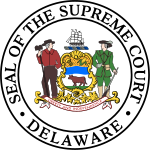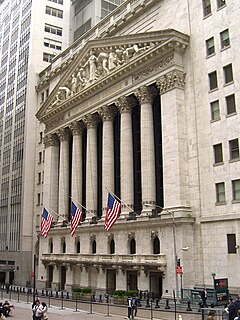| Unocal Corp. v. Mesa Petroleum Co. |
|---|
 |
| Court | Supreme Court of Delaware |
|---|
| Full case name | Unocal Corporation, a Delaware corporation v. Mesa Petroleum Co., a Delaware corporation, Mesa Asset Co., a Delaware corporation, Mesa Eastern, Inc., a Delaware corporation, and Mesa Partners II, a Texas partnership |
|---|
| Decided | May 17, 1985 (oral decision)
June 10, 1985 (written opinion) |
|---|
| Citation(s) | 493 A.2d 946 (Del. 1985) |
|---|
|
| Judge(s) sitting | John J. McNeilly, Jr., Andrew G.T. Moore II, Justices, and Taylor, Judge |
|---|
Unocal v. Mesa Petroleum Co., 493 A.2d 946 (Del. 1985) [1] is a landmark decision of the Delaware Supreme Court on corporate defensive tactics against take-over bids.
Until the Unocal decision in 1985, the Delaware courts had applied the business judgment rule, when appropriate, to takeover defenses, mergers, and sales. [2]
In Unocal, the Court held that a board of directors may only try to prevent a take-over where it can be shown that there was a threat to corporate policy and the defensive measure adopted was proportional and reasonable given the nature of the threat.
This requirement has become known as the Unocal test for board of directors (as later modified in Unitrin, Inc. v. American General Corp. , which required the tactics to be "coercive" or "preclusive" before the court would step in).
Judgment
The Delaware Supreme Court reversed the trial court. [5]
It found that the Unocal's board of directors had reasonable grounds for believing that a danger to corporate policy or effectiveness existed and that the response was reasonable in relation to the threat posed. This reasonable relation analysis permitted an analysis of the price, nature, and timing of the offer as well as the impact on shareholders, creditors, customers, employees, and the community. Note that this permission to consider other constituencies besides the shareholders was curtailed in Revlon v. MacAndrews .
The Unocal test the court established in this case to determine whether directors may try to prevent a take-over is a two pronged test. The two prongs include:
- First, did the directors reasonably perceive a threat? And,
- Second, was the directors' defensive measure reasonable in relation to the threat posed?
Note that whereas Cheff v. Mathes had sanctioned greenmail, or payment to the raider to go away, in Unocal the court sanctioned reverse greenmail, or payment to shareholders excluding the raider.
A shareholder rights plan, colloquially known as a "poison pill", is a type of defensive tactic used by a corporation's board of directors against a takeover.
In business, a takeover is the purchase of one company by another. In the UK, the term refers to the acquisition of a public company whose shares are listed on a stock exchange, in contrast to the acquisition of a private company.
Union Oil Company of California, and its holding company Unocal Corporation, together known as Unocal was a major petroleum explorer and marketer in the late 19th century, through the 20th century, and into the early 21st century. It was headquartered in El Segundo, California, United States.
Greenmail or greenmailing is the action of purchasing enough shares in a firm to challenge a firm's leadership with the threat of a hostile takeover to force the target company to buy the purchased shares back at a premium in order to prevent the potential takeover.
The business judgment rule is a case law-derived doctrine in corporations law that courts defer to the business judgment of corporate executives. It is rooted in the principle that the "directors of a corporation... are clothed with [the] presumption, which the law accords to them, of being [motivated] in their conduct by a bona fide regard for the interests of the corporation whose affairs the stockholders have committed to their charge". The rule exists in some form in most common law countries, including the United States, Canada, England and Wales, and Australia.

The Supreme Court of Delaware is the sole appellate court in the United States state of Delaware. Because Delaware is a popular haven for corporations, the Court has developed a worldwide reputation as a respected source of corporate law decisions, particularly in the area of mergers and acquisitions.

Smith v. Van Gorkom 488 A.2d 858 is a United States corporate law case of the Delaware Supreme Court, discussing a director's duty of care. It is often called the "Trans Union case". Van Gorkom is sometimes referred to as the most important case regarding business organizations because it shows a unique scenario when the board is found liable even after applying the business judgment rule. The decision "stripped corporate directors and officers of the protective cloak formerly provided by the business judgment rule, rendering them liable for the tort of gross negligence for the violation of their duties under the rule."
A squeeze-out or squeezeout, sometimes synonymous with freeze-out, is the compulsory sale of the shares of minority shareholders of a joint-stock company for which they receive a fair cash compensation.
Hogg v Cramphorn Ltd [1967] Ch 254 is a famous UK company law case on director liability. The Court held that corporate directors who dilute the value of the stock in order to prevent a hostile takeover are breaching their fiduciary duty to the company.

Unitrin, Inc. v. American General Corp., 651 A.2d 1361 is the leading case on a board of directors' ability to use defensive measures, such as poison pills or buybacks, to prevent a hostile takeover. The case demonstrates an approach to corporate governance that favors the primacy of the board of directors over the will of the shareholders.

In United States corporation and business association law, a duty of care is part of the fiduciary duty owed to a corporation by its directors. The other aspects of fiduciary duty are a director's duty of loyalty and (possibly) duty of good faith.

Cheff v. Mathes, 199 A.2d 548, was a case in which the Delaware Supreme Court first addressed the issue of director conflict of interest in a corporate change of control setting. This case is the predecessor to future seminal corporate law cases including: Unocal Corp. v. Mesa Petroleum Co., Revlon v. MacAndrews, and Paramount v. Time.

The United Kingdom company law regulates corporations formed under the Companies Act 2006. Also governed by the Insolvency Act 1986, the UK Corporate Governance Code, European Union Directives and court cases, the company is the primary legal vehicle to organise and run business. Tracing their modern history to the late Industrial Revolution, public companies now employ more people and generate more of wealth in the United Kingdom economy than any other form of organisation. The United Kingdom was the first country to draft modern corporation statutes, where through a simple registration procedure any investors could incorporate, limit liability to their commercial creditors in the event of business insolvency, and where management was delegated to a centralised board of directors. An influential model within Europe, the Commonwealth and as an international standard setter, UK law has always given people broad freedom to design the internal company rules, so long as the mandatory minimum rights of investors under its legislation are complied with.
The Bull-dog Sauce Case is a Supreme Court of Japan case that resulted in a landmark decision regarding hostile takeover defense plans. The Court held that such plans do not necessarily violate the principle of shareholder equality under Japanese statutes, even if they result in discriminatory treatment some shareholders; however, such decisions must be made by shareholders themselves, acting in the company's best interest; they cannot be made by management to protect itself. The Bull-dog Sauce case arose from the first use of a poison pill by a Japanese company, and resulted in the Supreme Court's first ruling on the subject of takeover defenses.

United States corporate law regulates the governance, finance and power of corporations in US law. Every state and territory has its own basic corporate code, while federal law creates minimum standards for trade in company shares and governance rights, found mostly in the Securities Act of 1933 and the Securities and Exchange Act of 1934, as amended by laws like the Sarbanes–Oxley Act of 2002 and the Dodd–Frank Wall Street Reform and Consumer Protection Act. The US Constitution was interpreted by the US Supreme Court to allow corporations to incorporate in the state of their choice, regardless of where their headquarters are. Over the 20th century, most major corporations incorporated under the Delaware General Corporation Law, which offered lower corporate taxes, fewer shareholder rights against directors, and developed a specialized court and legal profession. Nevada has done the same. Twenty-four states follow the Model Business Corporation Act, while New York and California are important due to their size.

Revlon, Inc. v. MacAndrews & Forbes Holdings, Inc., 506 A.2d 173, was a landmark decision of the Delaware Supreme Court on hostile takeovers.
Criterion Properties plc v Stratford UK Properties LLC [2004] UKHL 28 is a leading UK company law concerning takeover defences that a board of directors may employ to prevent a bidder buying shareholders' shares without the board's consent. It held that it is an improper use of a directors' power to frustrate a takeover bid through issuing a poison pill.

Moran v. Household International, Inc., 500 A.2d 1346 is a decision of the Delaware Supreme Court that upheld a shareholder rights plan as a legitimate exercise of business judgment by Household International's board of directors. Moran is significant as the first case in which a U.S. state court upheld a shareholder rights plan.

Eclairs Group Ltd v JKX Oil & Gas plc[2015] UKSC 71 was a decision of the United Kingdom Supreme Court relating to the exercise of directors' powers for a proper purpose under English company law.

Paramount Communications, Inc. v. Time Inc., C.A. Nos. 10866, 10670, 10935 (Consol.), 1989 Del. Ch. LEXIS 77, Fed. Sec. L. Rep. (CCH) ¶ 94, 514, aff'd, 571 A.2d 1140, is a U.S. corporate law case from Delaware, concerning defensive measures in the mergers and acquisitions context. The Delaware Court of Chancery and the Supreme Court of Delaware upheld the use of defensive measures to advance the long-term goals of the target corporation, where the corporation was not in "Revlon mode".





